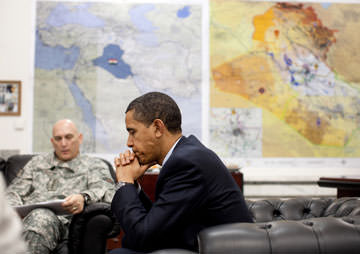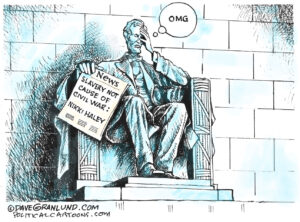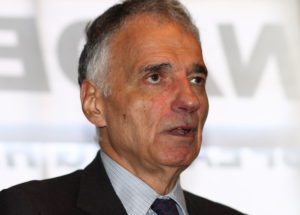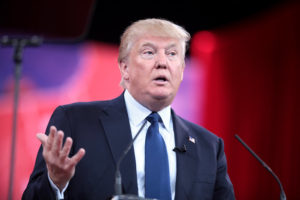The Lesson of Iraq
President Obama's instincts about Iraq and Syria have been sound from the beginning: Greater U.S. engagement probably cannot make things better but certainly can make them worse, both for the people of the region and for our national interests. White House/Pete Souza
White House/Pete Souza
White House/Pete Souza
President Obama’s instincts about Iraq and Syria have been sound from the beginning: Greater U.S. engagement probably cannot make things better but certainly can make them worse, both for the people of the region and for our national interests.
First, credit where it’s due: Colin Powell was prescient about Iraq, and Joe Biden was right.
It was Powell, before the 2003 invasion to topple Saddam Hussein, who warned George W. Bush that once U.S. military forces broke the Iraqi state we would own the “hopes, aspirations and problems” of 25 million people. Efforts over the past decade to glue the pieces back together have obviously failed.
It was then-Sen. Biden who argued that rather than insist on a unitary Iraq, we should accept the division of the country — along ethnic and religious lines — into separate Shiite, Sunni and Kurdish states. This is effectively what is happening now, but in the worst possible way.
Obama opposed the Iraq War from the start, seeing it as a strategic blunder. As he campaigned on an end-the-war platform in 2008, even he had no idea just how catastrophic the mistake would turn out to be.
Baghdad and the South are controlled by the sectarian Shiite-led regime of President Nouri al-Maliki, who has cultivated a close alliance with Iran. Much of the Northwest is in the hands of the Islamic State of Iraq and Syria, a Sunni fundamentalist militia whose brutality shocks even al-Qaeda. The Northeast is held by a Kurdish regional government that dreams of a Greater Kurdistan incorporating slices of Turkey, Syria and Iran.
Obama’s only mistake was to buy, for a time, the notion that Bush’s troop surge had miraculously healed ancient divisions and made the dream of a pluralist democracy still possible. But Maliki sent a consistent message to Sunnis and Kurds: Shiites are in charge. Deal with it.
Kurdish leaders responded by consolidating power in their own semi-autonomous region. The Sunni tribal chiefs who cooperated with U.S. forces against al-Qaeda during the surge have made a tactical alliance with ISIS, apparently believing that once an area of Sunni authority is demarcated the fundamentalists can be brought to heel. We shall see.
Would any of this have been avoided if Obama had left a substantial troop presence in Iraq? The question is moot, since Maliki refused to reach an agreement that would allow U.S. troops to stay. Critics who say that Obama negotiated as if he didn’t really want to make a deal should explain why making concessions to Maliki’s pro-Iran sectarian government would have been a good idea.
The engagement crowd says that ISIS might never have existed, and certainly would not have become so powerful, if Obama had done something in Syria. Just what was Obama supposed to do? Well, um, engagement, of course.
Even the most bellicose hawks acknowledge that sending U.S. troops into Syria is a terrible idea. Obama has been wary of sending heavy arms to the “good” Syrian rebels for fear they will fall into the hands of the bad ones. Given that the fundamentalists took the upper hand among the rebels very early in the civil war, Obama’s caution strikes me as prudent.
The president considered the one option that might have made sense: a punitive airstrike against the regime of Bashar al-Assad for its use of chemical weapons. But Congress told him no, and a deal was eventually reached under which Assad has surrendered all but a tiny fraction of his chemical weapons to international control. Doesn’t that count as constructive engagement?
What’s happening in the Middle East is the erasure of artificial borders drawn by French and British diplomats almost a century ago. Engagement seems to mean that today’s great powers, led by the United States, should enforce those old borders or impose new ones. Why should anyone think this is a recipe for stability?
There are aspects of Obama’s foreign policy that I question. His heavy reliance on drone strikes may create as many terrorists as it eliminates. He should have realized that the National Security Agency’s bulk collection of electronic communications, if revealed, would complicate relations with our allies. His announced “pivot” toward Asia is yet to be realized.
But I can find no reason to fault Obama’s unwillingness to intervene in Iraq and Syria. His view is supported by most Americans, according to polls. Anyone who disagrees should spell out just what they would like the president to do.
Eugene Robinson’s e-mail address is eugenerobinson(at)washpost.com.
© 2014, Washington Post Writers Group
Your support matters…Independent journalism is under threat and overshadowed by heavily funded mainstream media.
You can help level the playing field. Become a member.
Your tax-deductible contribution keeps us digging beneath the headlines to give you thought-provoking, investigative reporting and analysis that unearths what's really happening- without compromise.
Give today to support our courageous, independent journalists.






You need to be a supporter to comment.
There are currently no responses to this article.
Be the first to respond.